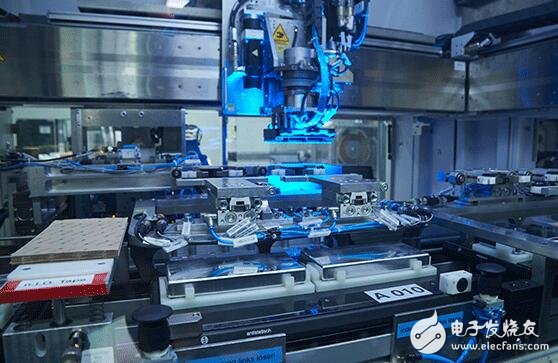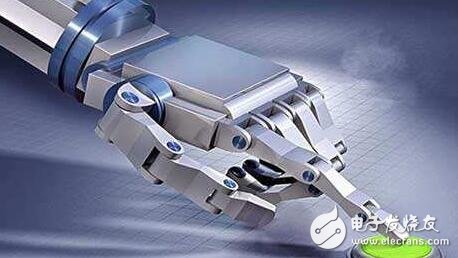Intelligent manufacturing is a general term for advanced manufacturing processes, systems and models based on next-generation information technology. Intelligent manufacturing runs through all aspects of manufacturing activities such as “design, production, management, and serviceâ€, and has functions such as information depth self-perception, smart optimization self-decision, and precise control self-execution. In the whole process of intelligent manufacturing, intelligent equipment (including but not limited to robots, CNC machine tools, automation integrated equipment, 3D printing, etc.) are organically connected through communication technology to realize the automation of the production process; and various production technologies are collected through various sensing technologies. Kinds of data, through industrial Ethernet and other means of communication, as well as various types of system optimization software to provide production solutions to achieve intelligent production programs.
It can be said that the social reality of the gradual disappearance of the domestic demographic dividend, the policy trend of import substitution and machine substitution, and the industrial and economic requirements characterized by individualized production and deepening global cooperation, constitute the smart manufacturing in the current financial And the reasons for the focus of industrial capital.

Please robots to make coffee and watch robots dance... Recently, the "robot supermarket" and the "Strait Intelligent Manufacturing Collaborative Innovation Industrial Park", which together gather the entire industrial chain of Xiamen's intelligent manufacturing industry, officially opened in Xiamen Intelligent Equipment Professional Park. Excellent enterprises in the upstream and downstream, including robot manufacturers, core component suppliers, system integrators, information software developers, solution service providers, quality user companies, etc., are the epitome of the development status of smart manufacturing in our city.
Intelligent manufacturing is the main direction of "Made in China 2025". At present, the city's machinery, electronics industry and software and information services industry "hard and soft" two-wheel drive intelligent manufacturing development. Among them, the transformation and upgrading of the machinery and electronics industry and the intelligent transformation of our city have achieved certain results: leading enterprises in key fields such as flat panel display, computer and communication equipment, engineering machinery, passenger cars and ships have strong digital design capabilities; passenger cars, The key production processes of high-end mechanical equipment such as construction machinery and ships all use numerical control equipment; the network and information management capabilities of leading enterprises have also established a good foundation. At the same time, the city's software and information services industry has emerged a number of Internet operating platforms; high-value-added high-end services such as integrated circuit design, information security, and embedded software are accelerating, and are constantly transforming into services.
The manufacturing industry of our city actively responds to the increasingly diversified, customized and miniaturized user needs of the Internet era, and has cultivated a number of system integrators across sectors and levels. As a bridge from smart manufacturing technology to manufacturing companies, the role of system integrators is to rationally lay out the vast array of hardware and software involved in intelligent manufacturing to achieve the specific functions required. At present, the city has already possessed highly influential system integrators such as Sierte Robot and Yingqu Technology, and initially formed an industrial public domain in the field of intelligent manufacturing system integration such as “robot supermarketâ€, providing for the development of intelligent manufacturing. A strong support.
The latest manufacturing solutions, such as smart factories, manufacturing clouds, and industrial clouds, can collect, mine, and reuse data generated by machines and equipment, enabling people to connect with machines and data to form a new digital industrial ecosystem. It is also the direction in which our city develops intelligent manufacturing efforts. The Municipal Economic and Information Bureau takes "robot supermarket" as an important means of promotion and establishes a smart manufacturing industry platform in the city. The next step will be to accelerate the construction of regional industrial cloud communities, encourage enterprises to go to the cloud, and regularly hold intelligent manufacturing industry matchmaking meetings to assist the city. SMEs will enhance the level of informatization and intelligence, enhance endogenous competitiveness, and lead the growth of traditional industries.

1, smart products (Smart Product )
Smart products typically include mechanical, electrical, and embedded software with memory, sensing, computing, and transmission capabilities. Typical smart products include smartphones, smart wearables, drones, smart cars, smart appliances, smart vending machines, smart gear, and many smart hardware products.
2. Smart Service
Based on sensors and the Internet of Things (IoT), you can sense the status of your products for preventive maintenance and repair, help customers replace spare parts in a timely manner, and even help customers bring business opportunities by knowing the status of their products. It can also collect big data from product operations to assist companies in making marketing decisions. In addition, the company develops an APP for customer service, which is also a means of intelligent service, which can provide targeted services for products purchased by enterprises, thereby locking users and launching service marketing.
3, smart equipment (Smart Equipment)
Manufacturing equipment has experienced the development of mechanical equipment to CNC equipment, and is now gradually developing into intelligent equipment. The intelligent equipment has a detection function, which can realize on-machine detection, thereby compensating for machining errors, improving machining accuracy, and also compensating for thermal deformation. In the past, some precision equipment required high environmental requirements. Now, with closed-loop detection and compensation, the environmental requirements can be reduced.
4, intelligent production line (Smart ProducTIon line)
Companies in many industries rely heavily on automated production lines such as steel, chemicals, pharmaceuticals, food and beverage, tobacco, chip manufacturing, electronic assembly, automotive and parts manufacturing to achieve automated processing, assembly and inspection, and production of some mechanical standard parts. Automated production lines, such as bearings, are also used. However, equipment manufacturing companies are still dominated by discrete manufacturing. The key point of technological transformation of many enterprises is to establish automated production lines, assembly lines and inspection lines. U.S. Boeing’s aircraft assembly plant has established a U-shaped pulsating assembly line. Automated production lines can be divided into rigid automated production lines and flexible automated production lines, and flexible automated production lines generally have buffers. In order to improve production efficiency, industrial robots and hanging systems are increasingly used in automated production lines.
5, smart workshop (Smart workshop)
A shop usually has multiple production lines that either produce similar parts or products or have an upstream and downstream assembly relationship. To realize the intelligence of the workshop, real-time collection and analysis of information such as production status, equipment status, energy consumption, production quality, material consumption, etc., efficient scheduling and reasonable scheduling, significantly improve equipment utilization (OEE). Therefore, no matter what manufacturing industry, manufacturing execution system (MES) becomes an inevitable choice for enterprises.

6, smart factory (Smart Factory )
A factory usually consists of multiple workshops, and a large enterprise has multiple plants. As a smart factory, not only the production process should be automated, transparent, visual, and lean. At the same time, product testing, quality inspection and analysis, and production logistics should also be closed-loop integrated with the production process. Information sharing, on-time delivery, and collaborative work should be realized between multiple workshops in a factory. Some discrete manufacturing companies have also established production command centers like process manufacturing companies to command and dispatch the entire plant to detect and solve unexpected problems in a timely manner. This is also an important symbol of smart factories. Smart factories must rely on seamlessly integrated information systems support, including the five core systems of PLM, ERP, CRM, SCM and MES. The smart factory of a large enterprise needs to use the ERP system to develop a production plan for multiple workshops (ProducTIonplanning), and the MES system performs detailed scheduling (ProducTIonscheduling) according to the production plan of each workshop. The granularity of MES scheduling is days, hours, or even minutes. .
7. Intelligent R&D (Smart R&D)
In the aspect of product development, discrete manufacturing companies have applied computer aided design, computer-aided engineering, computer-aided process design, computer-aided manufacturing and other tool software and product lifecycle management, product data management systems. To develop smart products, enterprises need the cooperation of electromechanical soft multi-disciplinary; to shorten the product development cycle, it is necessary to apply the simulation technology in depth, establish a virtual digital prototype, realize multi-disciplinary simulation, reduce physical testing through simulation, and implement standardization and serialization. Modular thinking to support high-volume customer customization or product customization; simulation technology and test management need to be combined to improve the confidence of simulation results. Process manufacturing companies have begun to apply PLM systems for process management, recipe management, and laboratory information management.
8, intelligent management (Smart Management)
The core operational management system of the manufacturing enterprise also includes human assets management system (HCM), customer relationship management system (CRM), enterprise asset management system (EAM), energy management system (EMS), supplier relationship management system (SRM), and enterprise. Portal (EP), business process management system (BPM), etc., domestic enterprises also use office automation (OA) as a core information system. In order to centrally manage the core data of the enterprise, in recent years, Master Data Management (MDM) has also begun to deploy applications in large enterprises. The most important condition for intelligent management and intelligent decision making is that the basic data is accurate and the main information system is seamlessly integrated.
9, intelligent logistics and supply chain (Smart logisTIcs and SCM)
The procurement, production and sales processes within the manufacturing enterprise are accompanied by the flow of materials. Therefore, more and more manufacturing companies pay more attention to logistics automation, automation warehouse, and unmanned guided vehicles. AGV) and intelligent hanging systems have been widely used; in the logistics centers of manufacturing companies and logistics companies, the application of intelligent sorting systems, stacking robots, and automatic roller systems has become increasingly popular. Warehouse management systems and transportation management systems are also receiving widespread attention from manufacturing companies and logistics companies.
10. Smart Decision Making
In the course of operations, enterprises generate a large amount of data. On the one hand, it is the core business data generated by various business departments and business systems, such as data related to contracts, payment, expenses, inventory, cash, products, customers, investment, equipment, production, delivery, etc., which are generally structures. The data can be analyzed and forecasted in multiple dimensions. This is the scope of Business Intelligence (BI) technology, also known as management cockpit or decision support system. At the same time, companies can apply these data to extract the KPIs of the company and compare them with the preset goals. At the same time, the KPIs are decomposed at different levels to assess the cadres and employees. This is the scope of enterprise performance management. From a technical point of view, memory computing is an important support for BI.

Rugged Barcode Scanner,Rugged Barcode,Rugged Scanner,Rugged Handheld Scanner
Guangzhou Winson Information Technology Co., Ltd. , https://www.barcodescanner-2d.com